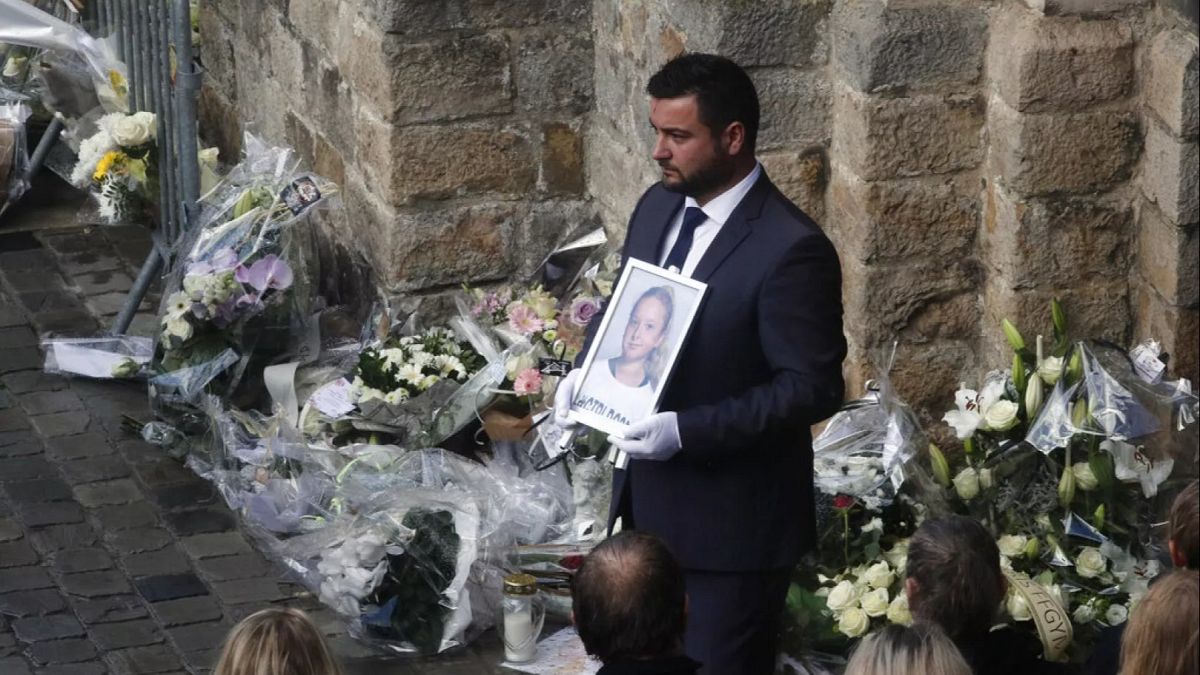French prosecutors have called for a life sentence for 27-year-old Dahbia Benkired, accused of the rape, torture and murder of 12-year-old Lola Daviet in Paris in October 2022, a punishment so rare it has never before been handed down to a woman in France.
The Algerian national is standing trial for the murder of Lola, a case which horrified the country and fuelled anti-immigration sentiment after it was revealed she had no legal right to be in France.
The far right seized on the case to criticise the government’s immigration policies after it emerged Benkired had been ordered to leave French territory two months before the schoolgirl’s murder.
A case that shocked France
Lola’s body was found stuffed inside a plastic trunk on a Paris street near her home.
The 12-year-old had returned from school on 14 October 2022 to the building in the northeast of the French capital where her parents worked as door attendees.
Surveillance footage showed Benkired, who was homeless and unemployed but staying at her sister’s apartment in the same building, meeting the child shortly after 3 pm.
When Lola failed to return home, her parents raised the alarm. An hour and a half later, Benkired was seen on camera again in the building’s entrance hall, surrounded by suitcases, including the large trunk where the girl’s body would later be found.
Benkrired was arrested shortly afterwards and, following multiple psychiatric evaluations, deemed fit to stand trial. She has been held at Fresnes prison, south of Paris, for the past three years.
“I’m indifferent”
At the Paris criminal court on Friday, after an hour-long closing statement, the attorney general requested an irreducible life sentence. Only a handful of such sentences have been handed down since it was introduced in 1994.
The punishment, sometimes referred to as “real life imprisonment,” means there is no possibility of early release or a reduction in the length of the setence.
However, French law allows a review after 30 years, upon request by the convicted person. A special panel of five judges from the Court of Cassation, the country’s highest court, may authorise release, but only if it poses no serious threat to public order and after consulting victims’ families.
If confirmed, Benkired would become the first woman in France ever sentenced to life without parole.
A troubled background and chilling detachment
Experts told the court on Thursday that Benkired is criminally responsible for her actions.
They found no sign of mental illness or impaired judgement, describing her as of “normal intelligence” and free of any “psychiatric pathology.”
One psychiatric report described her as “cold, passive-aggressive, with contradictory and fantastical speech,” exhibiting “pathological narcissism,” antisocial behaviour and “a very high risk of reoffending.”
A second evaluation found “no depressive, anxious or post-traumatic symptoms” and noted her “very low empathy.”
Her emotional detachment has been noted since her arrest. “At no moment did she show any sign of regret, to the point that it made me doubt her guilt despite all the evidence pointing to her. The facts were so horrific that I expected her to break down,” a police officer testified.
When shown photos of the tortured victim, Benkired said: “I feel indifferent.”
The court also examined Benkired’s past: a childhood marked by violence in Algeria, alleged sexual abuse and early cannabis use after arriving in France at 16.
Unable to find social or professional stability, she claimed that she drifted into sex work.
In her final words to the court before the jury retired to deliberate, Benkired said: “I ask for forgiveness, it’s horrible what I did, and that’s all I have to say.”
During the hearing, Benkired sat in the dock with a blank stare, never showing emotion.
Members of Lola’s family wore matching T-shirts bearing a drawing of the young girl and the words “You will be the sun of our lives and the star of our nights.”
The verdict is expected later on Friday evening.

